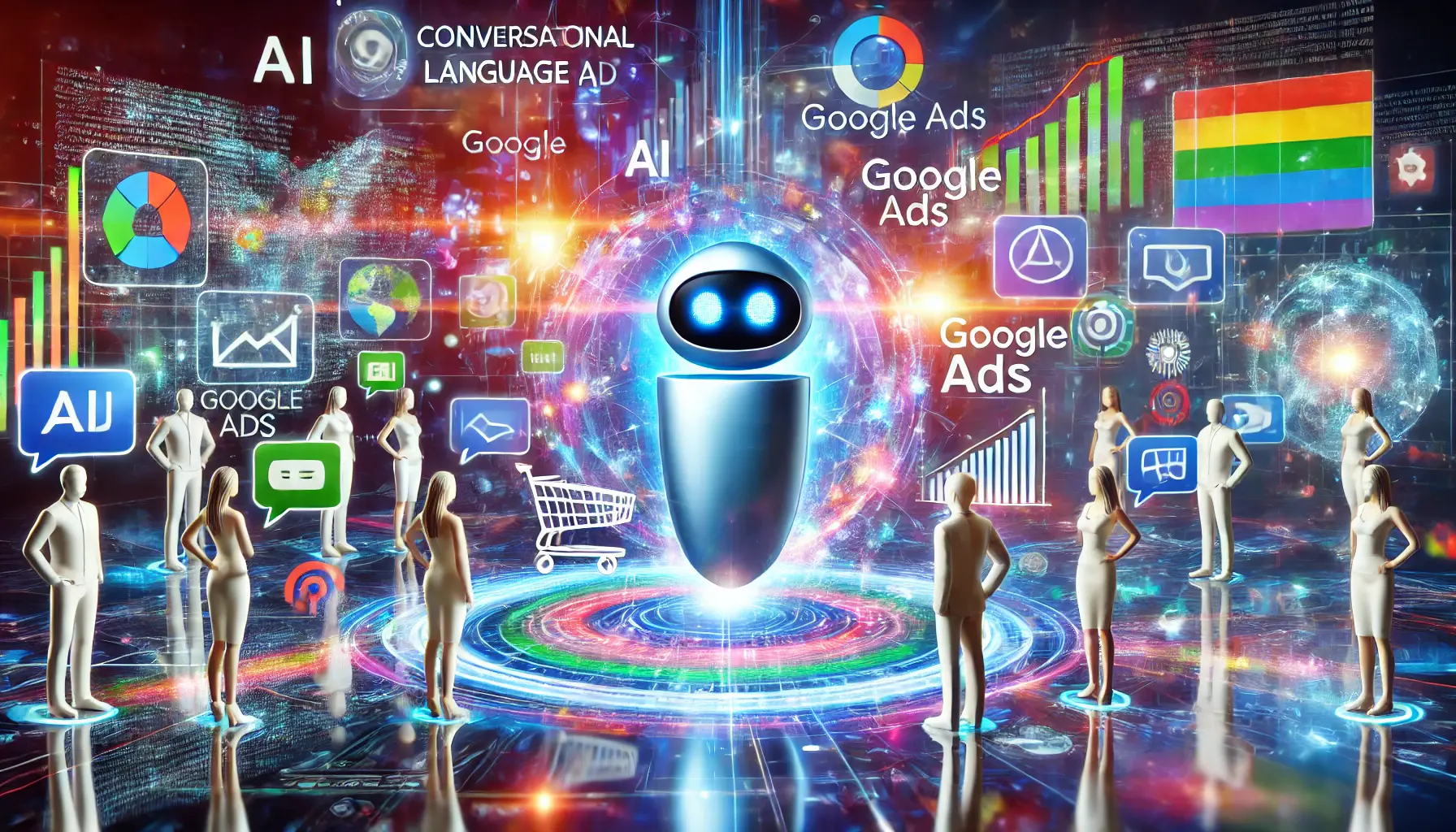In the rapidly evolving landscape of artificial intelligence, a new player has emerged, promising to revolutionize natural language processing (NLP).
DeepSeek R1, developed by the Chinese AI company DeepSeek, is making waves with its advanced capabilities and cost-effective approach.
But what exactly is DeepSeek R1, and how does it enhance NLP?
- Introduction to DeepSeek R1 in Natural Language Processing
- Key Features of DeepSeek R1
- Comparative Analysis: DeepSeek R1 vs. Other AI Models
- Applications of DeepSeek R1 in Natural Language Processing
- Challenges and Future Prospects of DeepSeek R1
- Final Thoughts on DeepSeek R1’s Impact on NLP
- DeepSeek R1: Frequently Asked Questions
Introduction to DeepSeek R1 in Natural Language Processing
DeepSeek R1 is an open-source large language modelA type of AI model designed to understand and generate human-like text by processing vast amounts of data. (LLM) designed to understand and generate human-like text.
Unlike traditional models, DeepSeek R1 emphasizes logical reasoning and problem-solving, setting a new standard in NLP applications.
Its development marks a significant milestone in AI, particularly in how machines comprehend and process human language.

A futuristic representation of DeepSeek R1, showcasing its advanced AI capabilities.
Overview of DeepSeek R1
At its core, DeepSeek R1 is built upon a 671-billion-parameter architecture, enabling it to handle complex language tasks with remarkable efficiency.
This extensive parameter count allows the model to grasp nuanced language patterns, making it adept at various applications, from conversational AI to machine translation.

A high-tech visualization of AI driving progress in natural language processing.
Significance in NLP Advancements
DeepSeek R1 represents a significant leap into the future of NLP.
Its open-source nature democratizes access to advanced AI, allowing developers worldwide to integrate sophisticated language understanding into their applications without prohibitive costs.
Beyond accessibility, its focus on reasoning enhances the quality of interactions, making responses more accurate and contextually relevant.
Imagine interacting with a customer service chatbot that not only understands your queries but also provides solutions with human-like reasoning.
Or consider a translation tool that captures the subtle nuances of language, delivering translations that are not just literal but contextually appropriate.
These are the possibilities that DeepSeek R1 brings to the table.
As we explore further, we will delve into the key features and applications that make DeepSeek R1 instrumental in transforming the NLP landscape.
With its innovative architecture and advanced reasoning abilities, DeepSeek R1 is setting a new benchmark in natural language processing.
DeepSeek R1 is not just another language model; it represents a paradigm shift in NLP, prioritizing logical reasoning and real-world problem-solving over mere text generation.
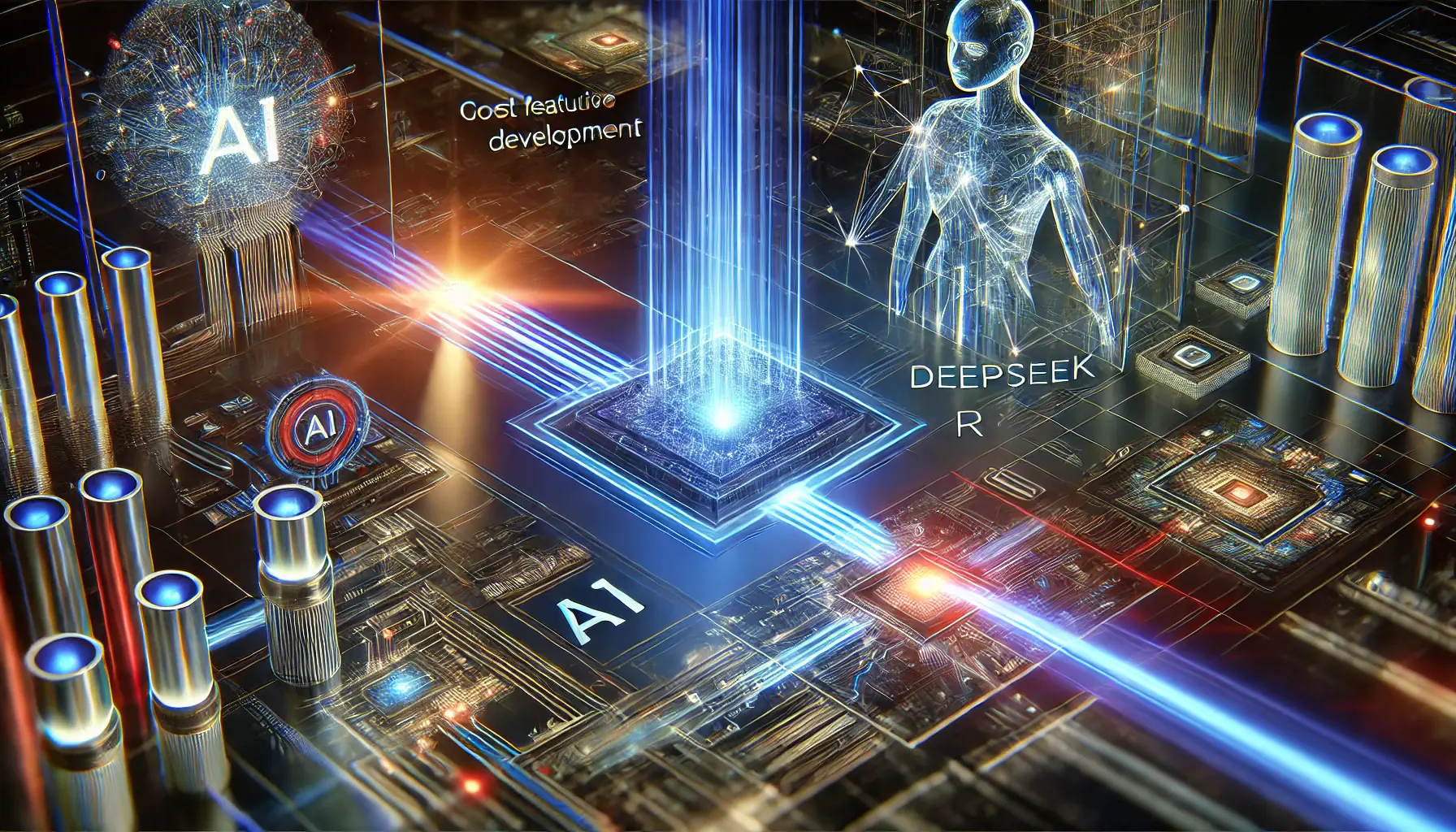
A high-tech visualization of DeepSeek R1’s key features in artificial intelligence.
Key Features of DeepSeek R1
DeepSeek R1 stands out in the AI landscape with several notable features that enhance its performance and accessibility.
Let’s delve into what makes this model exceptional.

A high-tech visualization of AI-driven advanced reasoning and decision-making.
Advanced Reasoning Capabilities
One of the standout features of DeepSeek R1 is its advanced reasoning capabilities.
The model excels in logical inferenceThe ability of an AI model to apply learned patterns to new data and generate predictions or responses., mathematical problem-solving, and real-time decision-making.
This proficiency enables it to handle complex tasks that require deep understanding and step-by-step reasoning, setting it apart from many other AI models.

A high-tech visualization of AI optimizing resources for cost-effective deployment.
Cost-Effective Development and Deployment
DeepSeek R1 is designed with cost-effectiveness in mind.
Its innovative architecture allows for efficient resource utilization, resulting in lower operational costs.
This efficiency makes it an attractive option for organizations looking to implement advanced AI solutions without incurring prohibitive expenses.

A high-tech visualization of AI democratization through open-source collaboration.
Open-Source Accessibility
Embracing openness, DeepSeek R1 is available under the MIT licenseA permissive open-source software license that allows users to freely use, modify, and distribute software with minimal restrictions., allowing developers and researchers worldwide to access, modify, and integrate it into their projects.
Greater accessibility fosters more innovation and collaboration, accelerating progress in the artificial intelligence community.
The combination of these features positions DeepSeek R1 among the leading AI tools—offering advanced capabilities, open accessibility, and cost-effective solutions that push the boundaries of natural language processing.
The combination of advanced reasoning, cost-efficiency, and open-source accessibility makes DeepSeek R1 a standout in the AI landscape.

A high-tech visualization of AI model comparisons, highlighting DeepSeek R1’s competitive edge.
Comparative Analysis: DeepSeek R1 vs. Other AI Models
In the rapidly evolving field of artificial intelligence, it’s essential to understand how different models stack up against each other.
Let’s explore how DeepSeek R1 compares to other leading AI models in terms of performance, resource efficiency, and industry adoption.
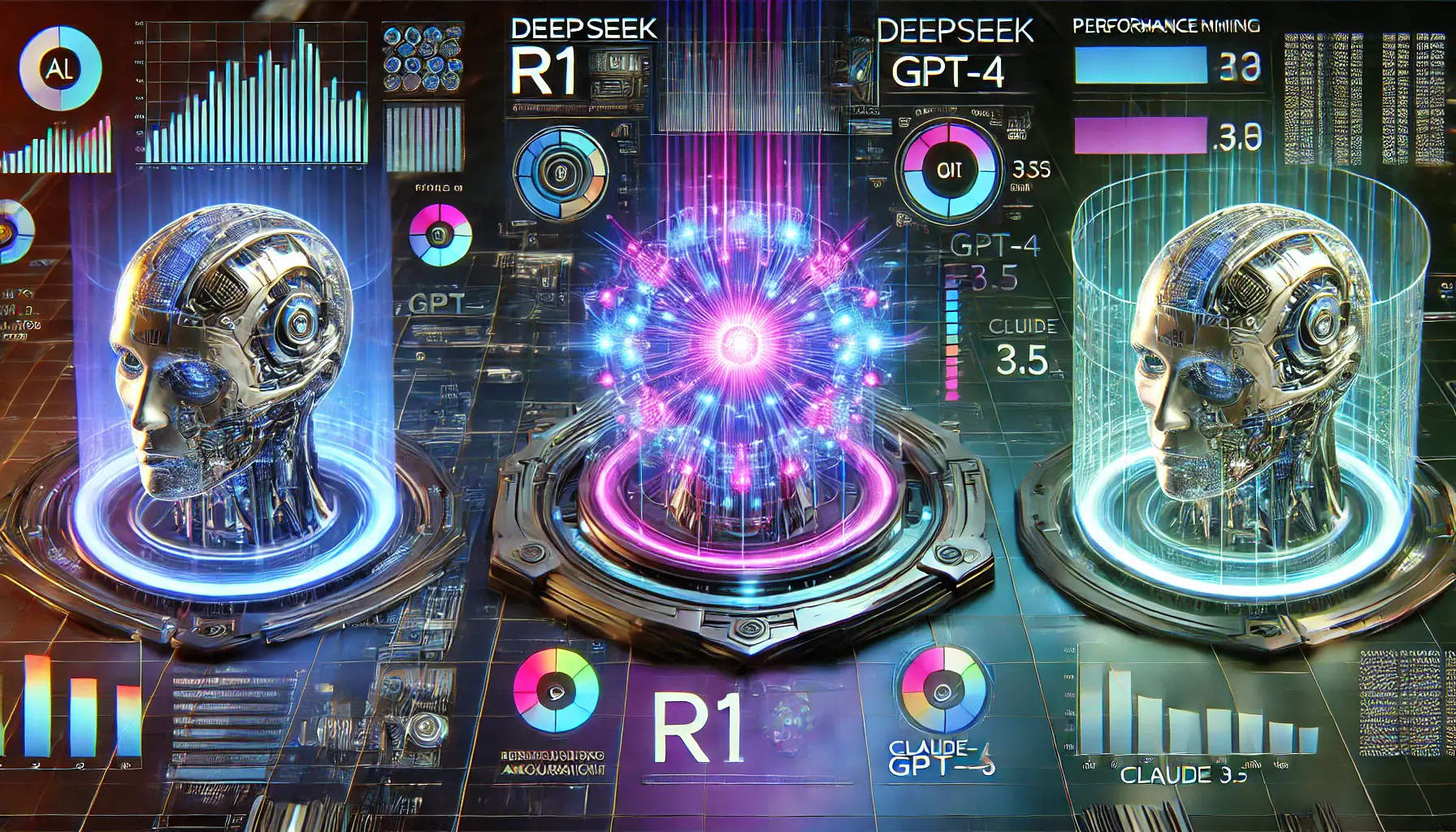
A high-tech visualization of AI performance benchmarking across leading models.
Performance Benchmarks Against GPT-4 and Claude 3.5
Various performance benchmarks for AI models provide a clear indication of their capabilities.
DeepSeek R1 produced outstanding results in several key assessments:
- Logical Reasoning: DeepSeek R1 attained a 92% accuracy rate in logical reasoning, surpassing GPT-4’s 78%.
- Mathematical Problem-Solving: The model demonstrates exceptional proficiency in solving mathematical problems, outperforming GPT-4.
These benchmarks highlight DeepSeek R1’s advanced reasoning capabilities, making it a formidable contender in the AI landscape.
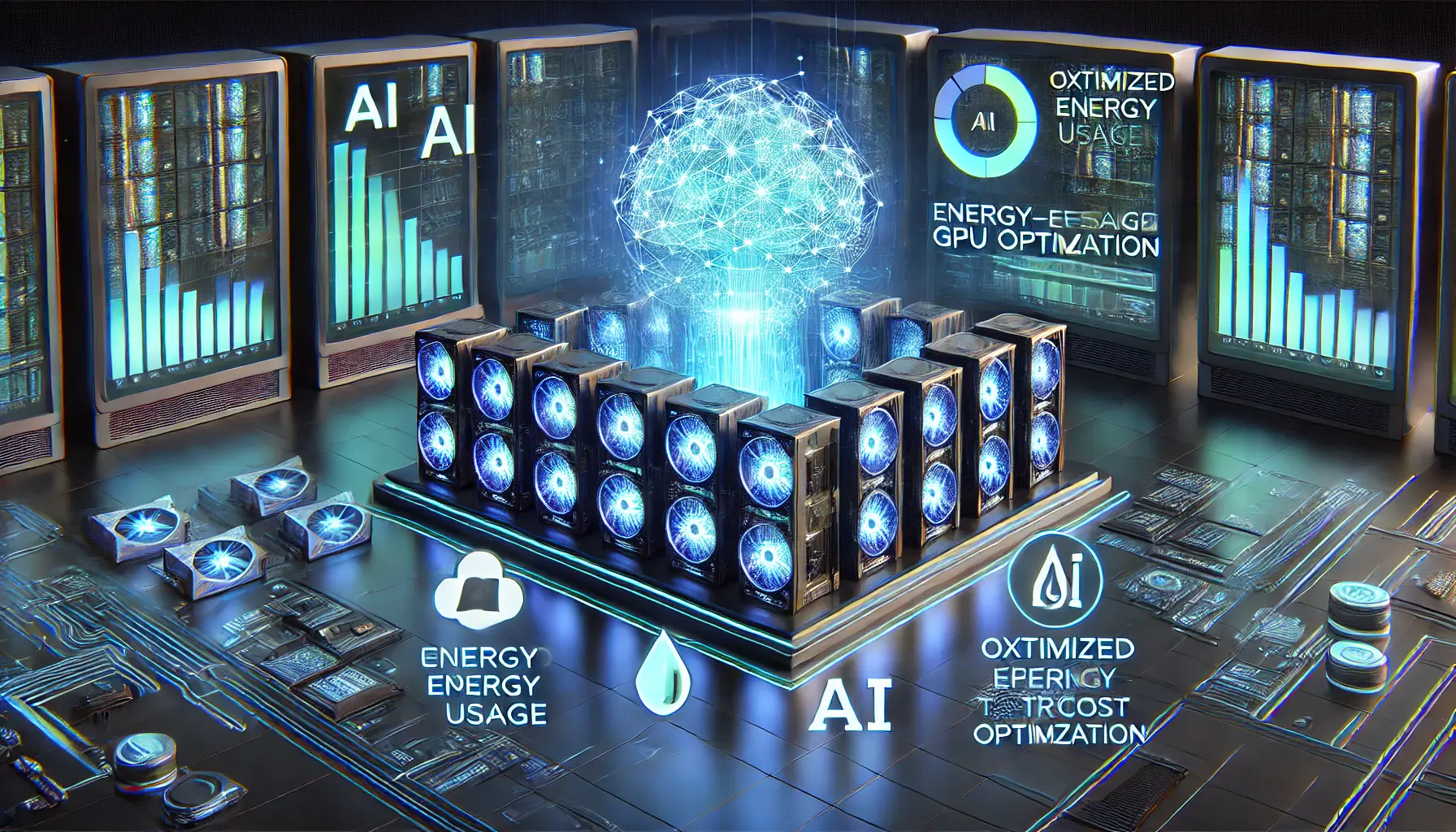
A high-tech visualization of AI resource efficiency and training cost optimization.
Resource Efficiency and Training Costs
Developing AI models often involves substantial computational resourcesHardware and software components required to process and execute AI model training and operations. and financial investment.
However, DeepSeek R1 stands out for its cost-effective development:
- Training Costs: The model was developed with an estimated training cost of $6 million, significantly lower than the $100 million reportedly spent on training GPT-4.
- Computational Efficiency: DeepSeek R1 requires fewer GPU hours for training compared to proprietary models, making it a more resource-efficient option for developers and organizations.
This efficiency not only cuts costs but also makes advanced AI development accessible to a wider range of institutions.

A high-tech visualization of AI integration by leading technology companies.
Adoption by Major Tech Companies
The impact of DeepSeek R1 extends beyond its technical achievements, influencing strategic decisions within major technology firms:
- Meta’s Perspective: Meta CEO Mark Zuckerberg acknowledged that insights from DeepSeek R1’s infrastructure optimizations could benefit Meta’s AI initiatives, emphasizing the importance of staying ahead in the competitive AI landscape.
- Industry Disruption: The release of DeepSeek R1 has prompted significant market reactions, leading to reevaluations of AI infrastructure investments across the tech industry.
These developments further highlight DeepSeek R1’s role in shaping the future direction of AI research and deployment.
By examining these aspects, we gain a comprehensive understanding of how DeepSeek R1 measures up against other prominent AI models, highlighting its strengths and potential impact on the broader AI community.
DeepSeek R1 challenges the dominance of established AI models by achieving superior logical accuracy and significantly reducing training costs.
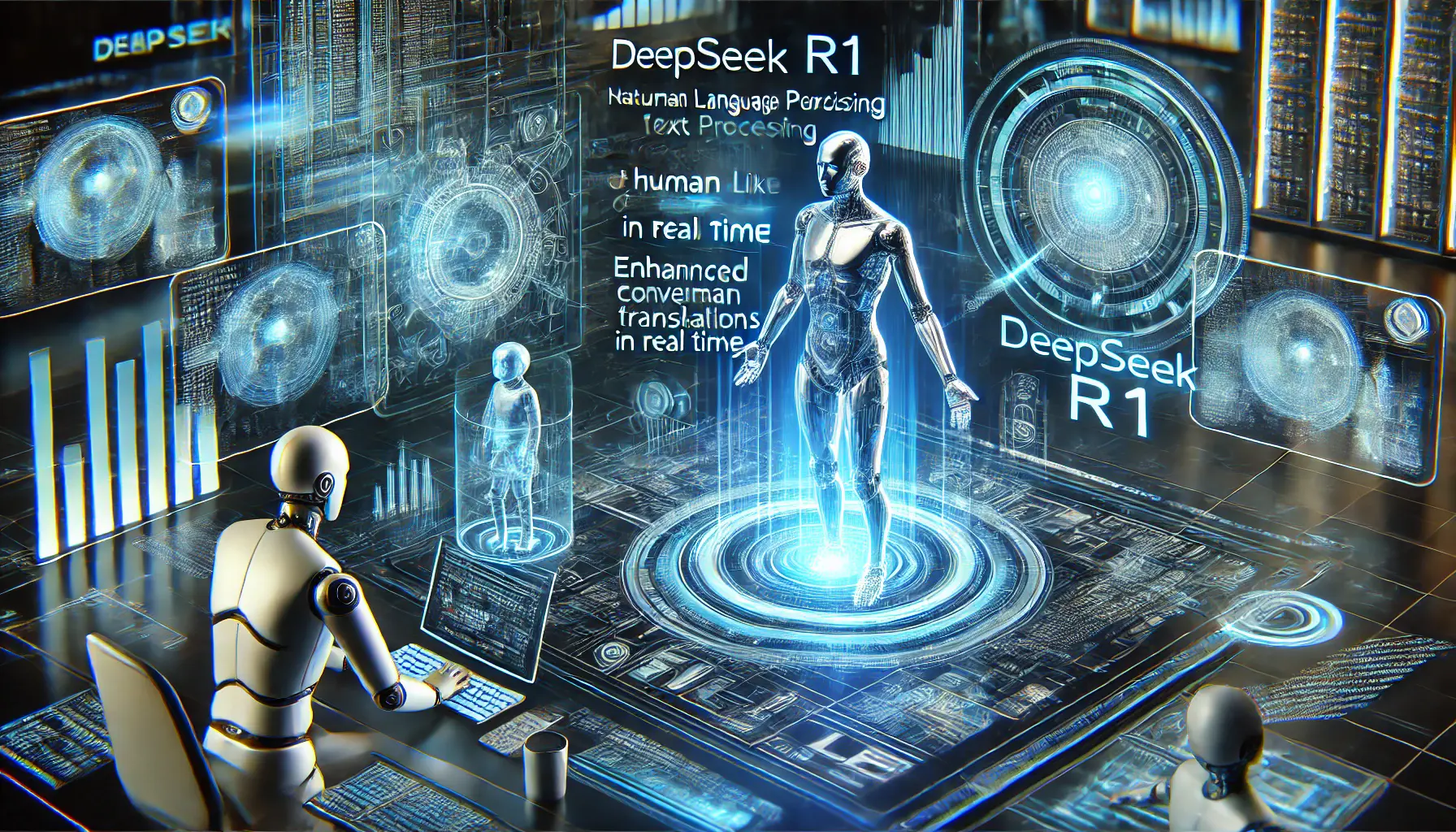
A high-tech visualization of DeepSeek R1’s role in advancing natural language processing.
Applications of DeepSeek R1 in Natural Language Processing
DeepSeek R1 has rapidly gained attention for its advanced capabilities in natural language processing (NLP).
Its applications span various domains, enhancing the way machines understand and generate human language.
Let’s explore some key areas where DeepSeek R1 is making a significant impact.

A high-tech visualization of AI-driven advancements in conversational interactions.
Enhancing Conversational AI
One of the standout applications of DeepSeek R1 is in conversational AI, where its advanced reasoning capabilities enable natural and contextually relevant interactions.
These improvements allow chatbots and virtual assistants to:
- Understand complex user requests with greater accuracy.
- Provide responses with enhanced contextual awareness.
- Maintain logical and engaging conversations for extended periods.
These advancements result in more satisfying user experiences, expanding the range of tasks that conversational AI can handle efficiently.

A high-tech visualization of AI-powered advancements in machine translation.
Improving Machine Translation
Machine translation systems benefit from DeepSeek R1’s nuanced language understanding, producing translations that are not only accurate but also culturally and contextually appropriate.
Key enhancements include:
- Better handling of idiomatic expressions and colloquialisms.
- Improved preservation of tone and intent across languages.
- Enhanced ability to manage complex sentence structures.
These capabilities make DeepSeek R1 a valuable asset for applications requiring high-quality translation services.

A high-tech visualization of AI-driven advancements in text summarization.
Advancements in Text Summarization
DeepSeek R1 excels in distilling large volumes of text into concise summaries without losing essential information.
This proficiency is particularly useful for:
- Generating executive summaries of lengthy reports.
- Creating brief overviews of extensive articles or documents.
- Assisting in information retrieval by highlighting key points.
By summarizing complex texts, DeepSeek R1 allows users to quickly grasp essential information, improving productivity and decision-making processes.
As DeepSeek R1 continues to evolve, its impact on NLP applications is expected to expand further, driving innovation and efficiency across industries.
From enhancing customer interactions with conversational AI to producing more accurate translations, DeepSeek R1 is reshaping how AI interacts with human language.

A high-tech visualization of the challenges and future potential of DeepSeek R1.
Challenges and Future Prospects of DeepSeek R1
While DeepSeek R1 has garnered significant attention for its advancements in artificial intelligence, it also faces several challenges that could impact its future development and adoption.
Let’s explore these challenges and the potential prospects for DeepSeek R1.

A high-tech visualization of data privacy and security concerns in AI.
Data Privacy and Security Concerns
One of the primary concerns surrounding DeepSeek R1 involves data privacy and security.
The model’s data storage and collection policies have raised questions about user privacy, particularly regarding the storage of information on servers located in China.
This has led to investigations by regulatory authorities in various countries, including Italy and the United States, to assess potential national security implications.

A high-tech visualization of the ethical dilemmas and censorship challenges in AI.
Ethical Considerations and Censorship
Another important issue is the ethical dimension of content moderationThe process of monitoring and managing user-generated content to ensure compliance with guidelines and policies. and censorship.
Reports indicate that DeepSeek R1 implements censorship mechanisms for topics deemed politically sensitive by the Chinese government.
This includes avoiding discussions on events such as the 1989 Tiananmen Square protestsA series of pro-democracy demonstrations in Beijing, China, in 1989, which were violently suppressed by the Chinese government. or human rights issues in China.
These practices raise ethical concerns regarding the model’s objectivity and the influence of governmental policies on AI-generated outputs.

A high-tech visualization of competition and market dynamics in the AI industry.
Competitive Landscape and Market Dynamics
The introduction of DeepSeek R1 has intensified competition in the AI industry, challenging established players.
Its cost-effective development and open-source nature have prompted major tech companies to reassess their AI strategies.
For example:
- Microsoft and Meta: These companies have acknowledged DeepSeek R1’s innovations and are exploring ways to incorporate similar advancements into their systems.
- Industry Acceleration: The competitive pressure created by DeepSeek R1 is driving rapid advancements in AI technology, prompting companies to refine their models to remain competitive.
While this market shift presents new opportunities, it also challenges DeepSeek R1 to maintain its competitive edge in an evolving landscape.

A high-tech visualization representing the future prospects of AI technology.
Future Prospects
Looking ahead, DeepSeek R1 has the potential to drive significant innovation in the field of AI.
Its open-source framework encourages collaboration and could lead to diverse applications across various industries.
However, long-term success will depend on overcoming the challenges outlined above.
Key factors shaping its future include:
- Data Privacy Measures: Strengthening security protocols to build trust among users and regulatory bodies.
- Ethical AI Development: Ensuring transparency and fairness in content moderation to address censorship concerns.
- Market Competitiveness: Continuing to refine model efficiency and scalability to remain a leader in AI innovation.
As the AI landscape continues to evolve, the ability of DeepSeek R1 to adapt and address these challenges will determine its role in shaping the future of artificial intelligence.
Despite its strengths, DeepSeek R1 faces challenges such as data privacy concerns, censorship issues, and competition from established AI players.
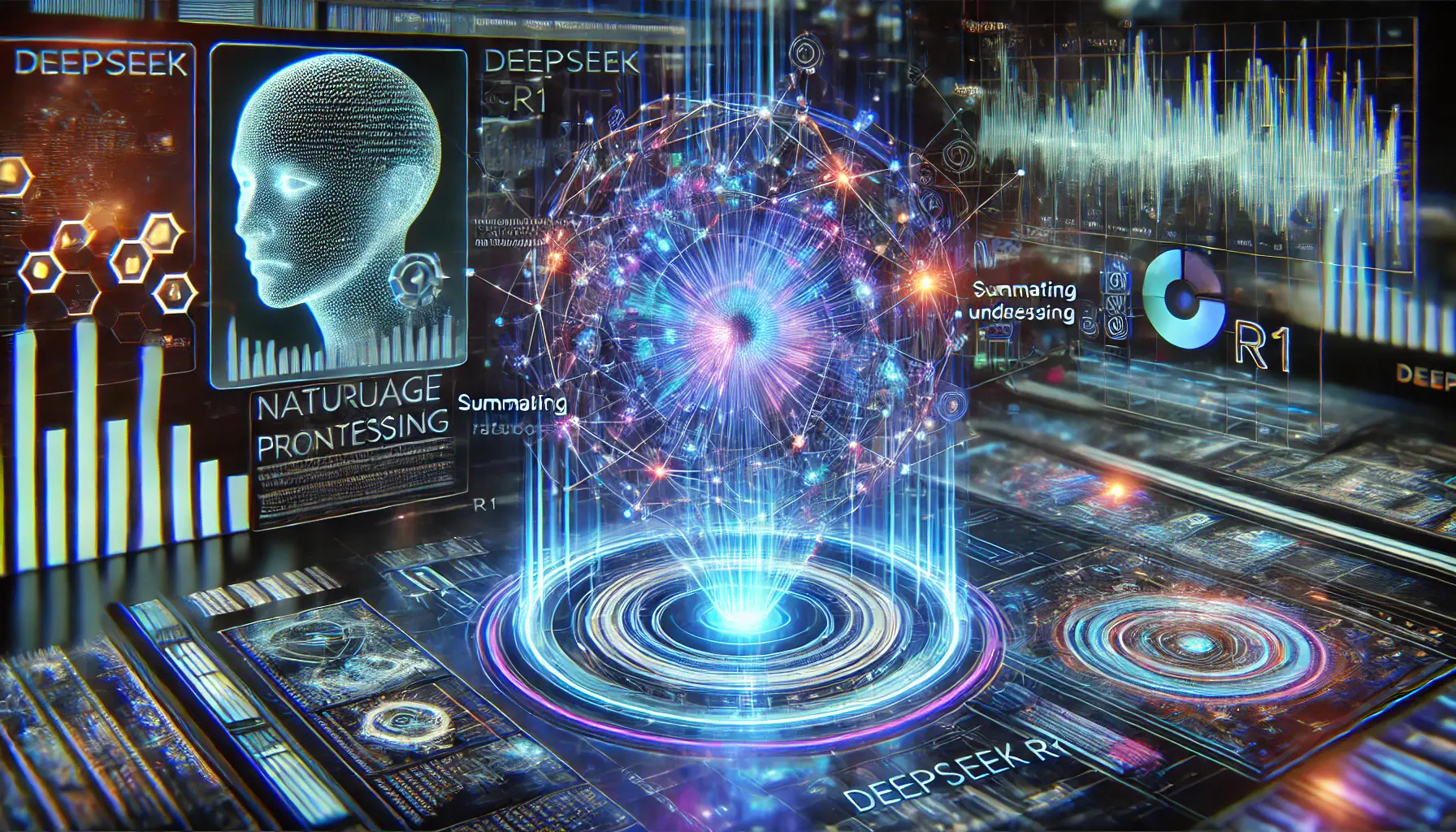
A high-tech visualization representing DeepSeek R1’s revolutionary impact on NLP.
Final Thoughts on DeepSeek R1’s Impact on NLP
DeepSeek R1 has emerged as a powerful force in the field of natural language processing, offering groundbreaking advancements in AI reasoning, cost-efficient development, and open-source accessibility.
This model is not just a technological innovation but a transformative tool that is redefining how machines interact with human language.
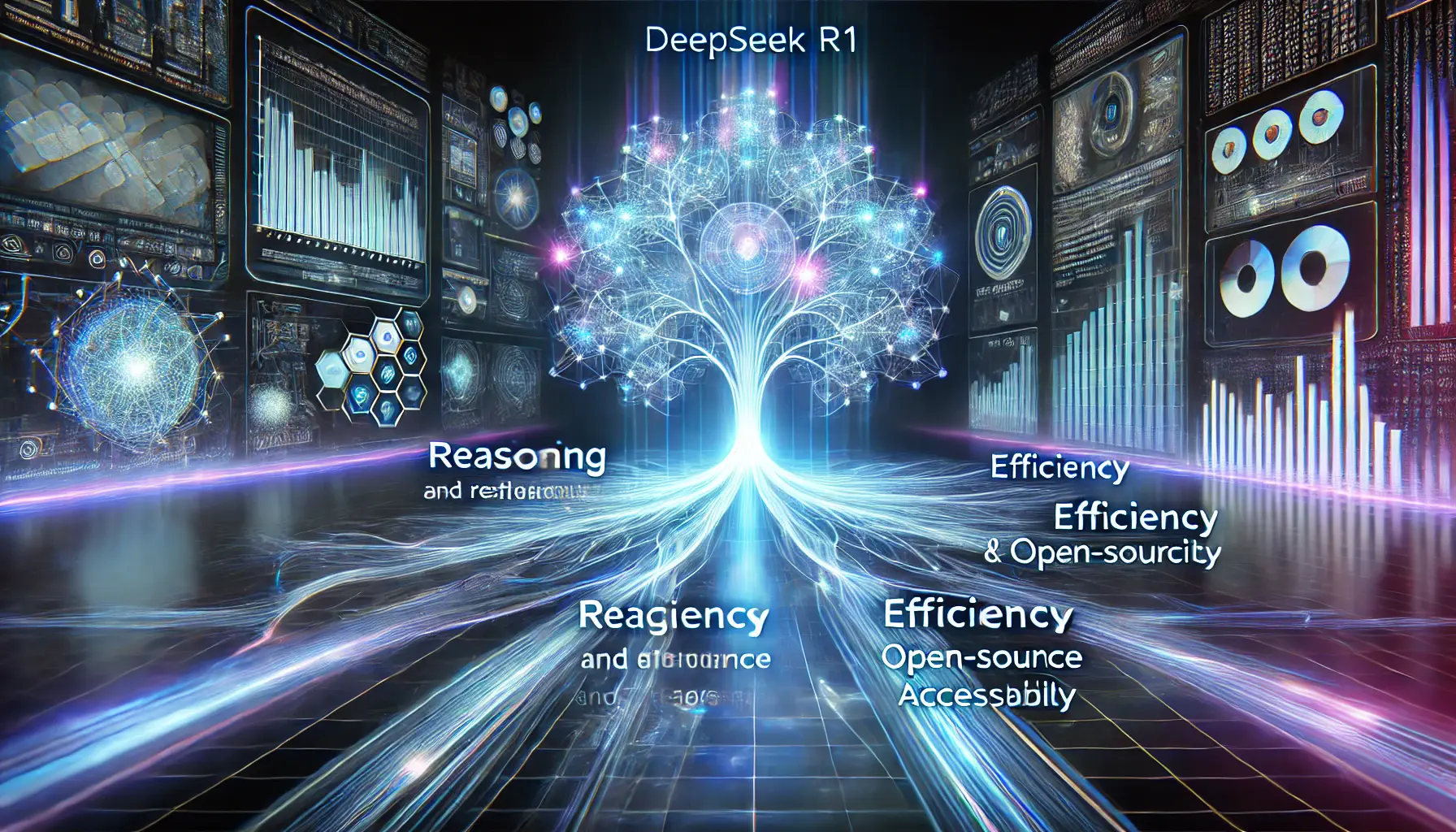
A high-tech visualization representing the key features and advancements of DeepSeek R1.
Key Takeaways from DeepSeek R1
Now let’s summarize the key insights from this article regarding DeepSeek R1, its features, applications, and future prospects:
- Unmatched Reasoning Capabilities: DeepSeek R1 surpasses many of its peers with advanced logical inference and problem-solving abilities.
- Cost-Effective AI Development: The model’s resource-efficient architecture ensures that organizations can leverage powerful AI capabilities without excessive costs.
- Expanding NLP Applications: From conversational AI to machine translation and text summarization, DeepSeek R1 is revolutionizing language processing for businesses and developers.
- Challenges and Ethical Concerns: While DeepSeek R1 offers immense benefits, it also raises important questions about data privacy, censorship, and ethical AI deployment.
- Future Growth and Market Influence: As the AI industry rapidly evolves, DeepSeek R1 is poised to play a significant role in shaping the next generation of NLP models.

A high-tech visualization representing the future impact and evolution of DeepSeek R1 in AI.
The Future of DeepSeek R1 in AI
The long-term success of DeepSeek R1 will depend on how effectively it navigates regulatory scrutiny, ethical considerations, and competitive market dynamics.
Its open-source nature provides a unique opportunity for continuous improvement, allowing developers worldwide to refine and expand its capabilities.
Several factors will determine its sustained impact on the AI landscape:
- Data Security and Compliance: Strengthening privacy protections to meet international regulations.
- Ethical AI Development: Ensuring fair and unbiased outputs to maintain credibility.
- Technological Innovation: Continued research to enhance efficiency, speed, and adaptability in NLP applications.
- Industry Adoption: Expanding partnerships with global tech companies to integrate DeepSeek R1 into diverse AI-driven platforms.
DeepSeek R1 represents a significant leap in AI-driven language models, with the potential to redefine human-machine interactions.
Whether it becomes a dominant force in the industry depends on its ability to evolve, address challenges, and uphold ethical AI standards.
One thing is certain: as AI technology continues to advance, DeepSeek R1 has set a new benchmark for the future of NLP, paving the way for even more intelligent and intuitive AI solutions.
DeepSeek R1 is poised to play a major role in AI-driven language processing, but its success will depend on balancing innovation with ethical considerations and market adaptation.

A high-tech visualization of AI answering questions in a sleek, futuristic environment.
DeepSeek R1: Frequently Asked Questions
DeepSeek R1 is an open-source large language model developed by DeepSeek, designed for advanced reasoning tasks in natural language processing.
It offers logical inference capabilities that improve AI-driven text generation and understanding.
Unlike many AI models, DeepSeek R1 emphasizes logical reasoning and problem-solving, making it particularly effective in complex NLP applications that require step-by-step thought processes.
Yes, DeepSeek R1 is open-source and accessible to developers and researchers worldwide under the MIT license, allowing for widespread adoption and innovation.
DeepSeek R1 boasts advanced reasoning capabilities, cost-effective development, and open-source accessibility, making it a versatile and scalable tool for various AI applications.
As an open-source model, data privacy policies depend on how users and organizations implement DeepSeek R1.
Developers must ensure compliance with regional regulations when deploying the model.
Ethical considerations surrounding DeepSeek R1 include addressing censorship concerns, preventing bias in AI-generated content, and ensuring transparency in model outputs.
Developers can access DeepSeek R1’s open-source code from its official repository and integrate it into their applications, customizing it for specific NLP tasks.
Industries such as customer service, translation, healthcare, and content generation can leverage DeepSeek R1 to improve language understanding, automation, and AI-driven decision-making.
While powerful, DeepSeek R1 requires significant computational resources, and its outputs may still need human oversight to ensure ethical and unbiased content generation.









